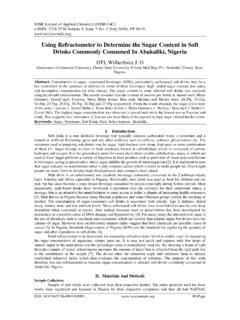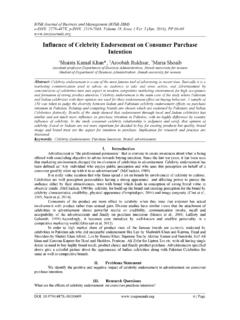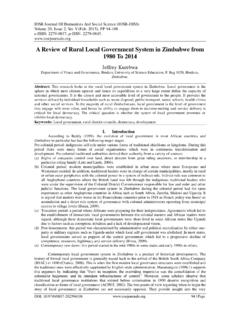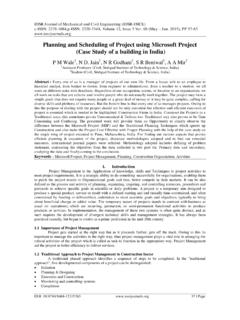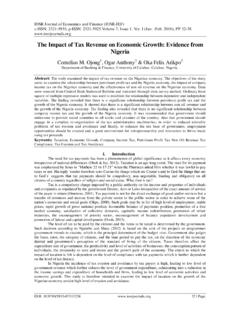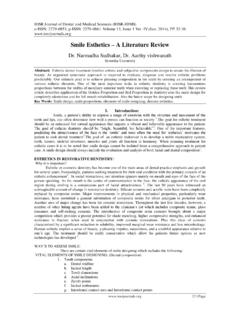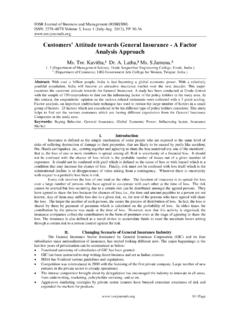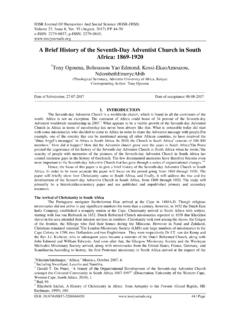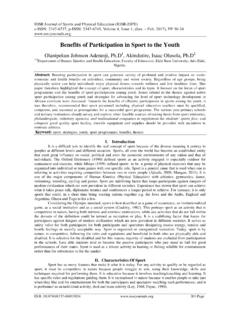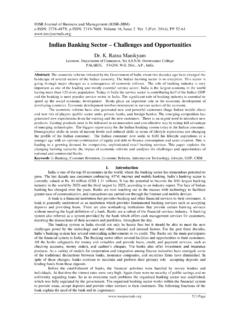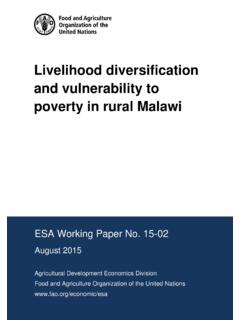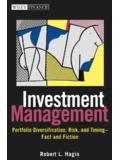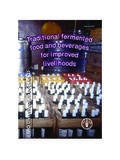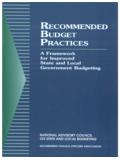Transcription of Diversification of Nigeria Economy through …
1 IOSR Journal of Economics and Finance (IOSR-JEF) e-ISSN: 2321-5933, p-ISSN: 7, Issue 6 Ver. III (Nov. - Dec. 2016), PP 104-107 DOI: 104 | Page Diversification of Nigeria Economy through Agricultural Production Adams Oluwadamilola Kemi Department of Science and Technology National Defence College Abuja, Nigeria Abstract: There is no doubt that petroleum (crude oil) has contributed substantially to Nigerian revenue since its discovery in 1956 and more especially, since 1970 when its price was on the upward trend, it is a well-known fact that Nigeria 's continuous large earnings or revenue from this sector will be impossible due to the reduction in oil price.
2 However, it is a known fact across the globe that for a country to attain growth and development, its Economy has to be diversified. Mono- Economy needs to give way to the productive development of various sectors of the Economy . As a matter of fact, there is an urgent need for the Nigerian government to begin looking into Diversification of the Economy into the agricultural sector so as to attain solid economic growth. These studies have shown that there exists a positive relationship between economic growth in Nigeria and Diversification into the agricultural sector.
3 Descriptive statistical method and correlation analysis was employed in this paper. This paper however, attempted to seek out how Diversification of the Economy will enhance stable and viable economic growth in Nigeria . Keywords: Economic Diversification , Agricultural production I. Introduction As global oil prices continue to fall sharply over the past 18 months, Nigerians, for an Economy that is largely dependent on oil needs not be told that tough times beckons. Thus we must recognize the urgency and severity of the matter. As a matter of fact, all efforts must be geared and directed towards the rejected stone, who must now become the chief corner stone as a means to set the nation s Economy on a path of rebirth and recovery.
4 Setting the nation s Economy on the path of rebirth and recovery requires a complete shift of attention back to the Agricultural sector as the only way out of this conundrum. Ogbeh, 2016. Before the discovery of oil in 1956 in Nigeria , Nigeria was famous in her agrarian Economy through which cash crops like palm produce, cocoa, rubber, timber, ground nuts, were exported, thus making Nigeria a major exporter in that respect. Also, Nigeria had 19 million heads of cattle, the largest in Africa. At present, Nigeria is no longer a major producer of groundnuts (peanuts), rubber, and palm oil. Cocoa production, mostly from obsolete varieties and overage trees, has nevertheless increased from around 180,000 tons annually to 350,000 tons.
5 Undoubtedly, the discovery of crude oil has contributed and assisted Nigeria 's economic prosperity and growth. Nevertheless, the current dwindling in oil price since June 2014, after five years of oil windfall, has immensely affected the Economy of major oil exporters like Nigeria , Saudi Arabia, Iraq and Libya, etc. as was majorly aggravated by Middle East unrest and wars. Another huge blow to crude oil exporters was America's reduction in the number of barrels they import from nations. These factors have created a bad market for Nigeria and thus, her Economy is presently shaking.
6 This scenario is worsening by Nigeria 's running mono-economic Economy and the abandonment of agriculture. The adverse effect of this boom and euphoria led to the establishment of new urban cities that necessitated mass exodus of able-bodied men and women from the rural areas to the cities in search of white-collar jobs and quick money. This development drastically reduced interest in agriculture and agrarian Economy . (Ariyo, 1997). Agricultural sector has been the leading provider of employment in Nigeria since the sixties and seventies, when the sector provided employment for more than 70 percent of the Nigerian population.
7 Unfortunately, in the wake of oil discovery, the attention on this sector of the Economy was gradually and myopically shifted to the oil sector where employment opportunities were very low and the traditional agricultural exports have been on a progressive decline. Regrettably, the scenario has given rise to acute unemployment as oil sector could only employ limited number of the population and worse still, only experts. The graph below provides us with a lot of information on the role agriculture played in Nigerian Gross Domestic Product before its neglect.
8 Navigating these roads thus should begin a journey to revisit the pre-oil boom years. In the 1960 s, the Agricultural sector was the most important one in terms of its contribution to domestic production, employment and foreign exchange earnings. During the oil boom decade of the 1970 s the sector remained largely stagnated and this accounts largely for the declining share of its contribution these days. Onikosi, 2015 Diversification of Nigeria Economy through Agricultural Production Adams Oluwadamilola Kemi DOI: 105 | Page II. Statement of the Problem Nigeria is technically in a state of economic recession Adeosun, 2016.
9 Every sector is troubled. The fact is, Nigeria moves one step forward and reverses by five steps backwards. We have had more political crises, debt servicing issues and turbulence in the oil sector to deal with, than the number of positives. The issue of high inflation, fluctuation in the foreign exchange market and fall in revenue Ibironke, 2016. A careful observer notices that the oil boom which would have been an enduring blessing to Nigeria has regrettably necessitated great shift of attention to oil money, which resulted to a total neglect of agriculture. Today, agriculture has suffered from long years of neglect, mismanagement, inconsistent and poorly conceived government policies, lack of government meaningful incentive to farmers, lack of basic infrastructure and a lot of bureaucratic bottlenecks in executing policies and agricultural programmes among government agencies The shift of focus to the Agricultural sector is the only bail out for the Economy .
10 The demand for agricultural product out there is very high, if we produce the right quantity and quality. It is good that the man has a good understanding of his job. However, government must be reminded that we are in this situation in the first place, due in part to its complacency, utter neglect and disdain for the Agricultural sector. This paper however, attempts to seek out how Diversification of the Economy will enhance stable and viable economic growth in Nigeria . Objective of the Study 1. Determine the relationship between Diversification into agricultural production and economic development in Nigeria ; 2.
